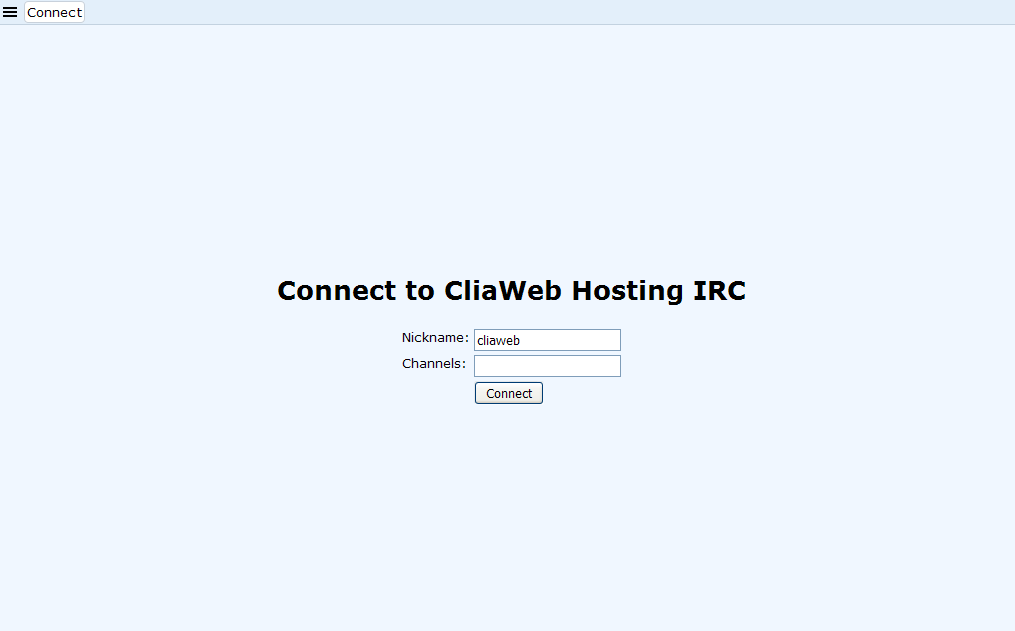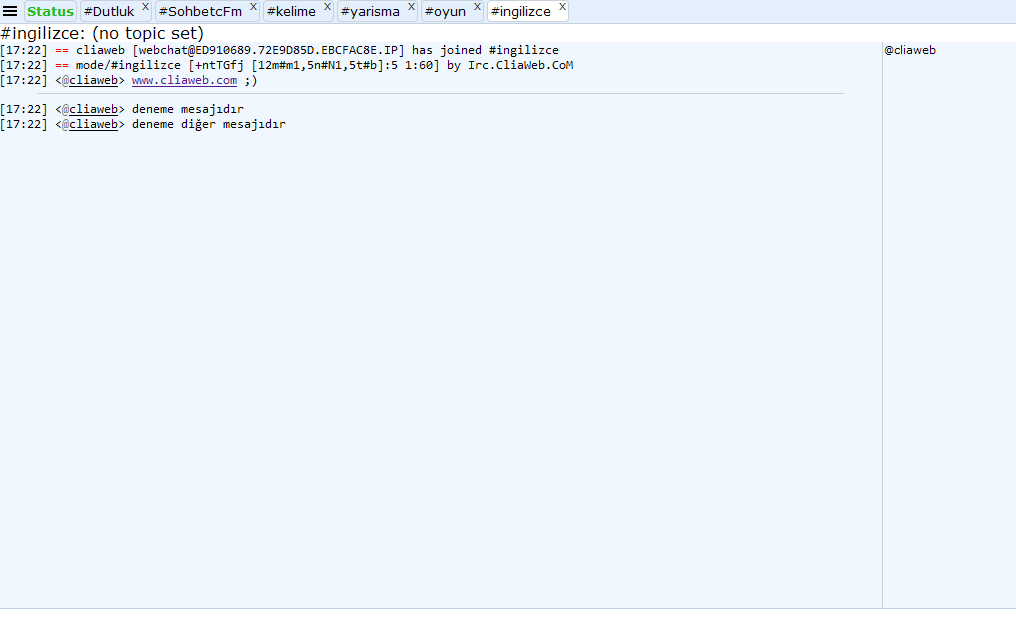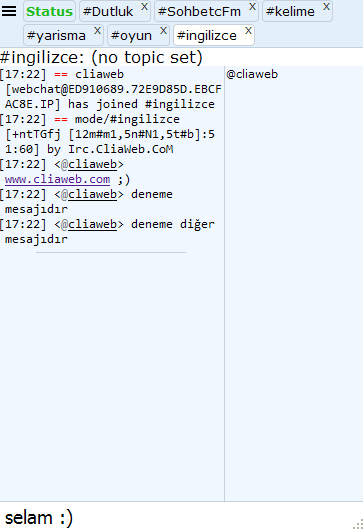qwebirc kısaca mevcut irc sunucunuzu mobil ziyaretçilere açan, web üzerinden mobil cihaz kullananların kolayca etkileşimde bulunmasını sağlayan bir eklentidir diyebiliriz. qwebirc config.py de belirteceğiniz irc sunucusu ile mobil ziyaretçileriniz arasında bir köprüdür. Elbette bu detaylı kurulum makalesini her zaman olduğu gibi yalnızca cliaweb hosting sizlere sunmaktadır.
Bu makalede yer alan qwebirc kurulumunu tüm VDS paketlerinde gerçekleştirebilirsiniz!
qwebirc Kurulumu İçin Gerekenler ;
|
1 2 3 4 5 6 |
python (2.5 üzeri olmalıdır). python-twisted, python-twisted-bin, python-twisted-core, python-twisted-runner, python-twisted-names, python-twisted-mail, python-twisted-words ve python-twisted-web (Twisted 8.2.0). python-zope.interface (8.2.0) mercurial openjdk-6 opsiyonel SSL desteği : python-openssl |
Aşağıdaki kurulum komutlarını işletim sisteminizin türüne göre çalıştırın. Örneğin biz Centos işletim sisteminde kurulum gerçekleştirdiğimiz için centos / rhel komutlarını çalıştırıyoruz ;
Centos / RHEL / Fedora için ;
|
1 2 3 4 5 6 7 8 |
sudo yum install epel-release sudo yum -y install python-twisted sudo yum -y install mercurial sudo yum install java-1.6.0-openjdk-devel sudo yum -y install libffi-devel sudo yum -y install openssl-devel sudo yum -y install python-devel sudo yum -y install python-pip |
Gerekebilir (ssl erişimlerinde) ;
|
1 |
sudo pip install pyopenssl --upgrade |
Ubuntu / Debian için ;
|
1 2 3 |
apt-get install python-twisted apt-get install python-zope.interface apt-get install mercurial |
Ardından qwebirc sunucumuza çekiyoruz ve düzenliyoruz ;
|
1 2 3 4 |
hg clone https://bitbucket.org/qwebirc/qwebirc cd qwebirc mv config.py.example config.py nano -w config.py |
Düzenlenmesi gereken örnek config.py kısımları ;
|
1 2 3 4 5 6 7 8 |
IRCSERVER, IRCPORT = "irckuruluolansunucuipadresi", 6667 REALNAME = "http://webchat.irc.cliaweb.com/" IDENT = "webchat" OUTGOING_IP = "127.0.0.1" WEBIRC_MODE = "webirc" WEBIRC_PASSWORD = "ŞİFRE" CGIIRC_STRING = "CGIIRC" BASE_URL = "http://webchat.irc.cliaweb.com/" |
Örnek config.py dosyası ;
|
1 2 3 4 5 6 7 8 9 10 11 12 13 14 15 16 17 18 19 20 21 22 23 24 25 26 27 28 29 30 31 32 33 34 35 36 37 38 39 40 41 42 43 44 45 46 47 48 49 50 51 52 53 54 55 56 57 58 59 60 61 62 63 64 65 66 67 68 69 70 71 72 73 74 75 76 77 78 79 80 81 82 83 84 85 86 87 88 89 90 91 92 93 94 95 96 97 98 99 100 101 102 103 104 105 106 107 108 109 110 111 112 113 114 115 116 117 118 119 120 121 122 123 124 125 126 127 128 129 130 131 132 133 134 135 136 137 138 139 140 141 142 143 144 145 146 147 148 149 150 151 152 153 154 155 156 157 158 159 160 161 162 163 164 165 166 167 168 169 170 171 172 173 174 175 176 177 178 179 180 181 182 183 184 185 186 187 188 189 190 191 192 193 194 195 196 197 198 199 200 201 202 203 204 205 206 207 208 209 210 211 212 213 214 215 216 217 218 219 220 221 222 223 224 225 226 227 228 229 230 231 232 233 234 235 236 237 238 239 240 241 242 243 244 245 246 247 248 249 250 251 252 253 254 255 256 257 258 259 260 261 262 263 264 265 266 267 268 269 270 271 272 273 274 275 276 277 278 279 280 281 282 283 284 285 286 287 288 289 290 291 292 293 294 295 296 297 298 299 300 301 302 303 304 305 306 307 308 309 310 311 312 313 |
# qwebirc configuration file # # This a Python program that is imported, so feel free to use any # Python here! # # Note that some changes to this configuration file require re-running # compile.py and others require restarting qwebirc (and some require # both!) # If in doubt always re-compile and restart. # The following line is required, don't remove it! from qwebirc.config_options import * # IRC OPTIONS # --------------------------------------------------------------------- # # OPTION: IRCSERVER # Hostname (or IP address) of IRC server to connect to. # OPTION: IRCPORT # Port of IRC server to connect to. IRCSERVER, IRCPORT = "37.123.101.155", 6667 # OPTION: SSLPORT # SSL port of IRC server to connect to. # If this option is uncommented it will override IRCPORT. #SSLPORT = 6697 # OPTION: REALNAME # The realname field of IRC clients will be set to this value. REALNAME = "http://moo.com/" # OPTION: IDENT # ident to use on irc, possible values include: # - a string, e.g. IDENT = "webchat" # - the literal value IDENT_HEX, this will set the ident to the # a hexadecimal version of the users IP address, e.g # IDENT = IDENT_HEX # - the literal value IDENT_NICKNAME, this will use the users # supplied nickname as their ident. IDENT = "webchat" # OPTION: OUTGOING_IP # The IP address to bind to when connecting to the IRC server. # # This will not change the IP address that qwebirc listens on. # You will need to call run.py with the --ip/-i option if you # want that. #OUTGOING_IP = "127.0.0.1" # OPTION: WEBIRC_MODE # This option controls how the IP/hostname of the connecting # browser will be sent to IRC. # # Possible values include: # - the string "webirc", i.e. WEBIRC_MODE = "webirc" # Use WEBIRC type blocks, with a server configuration of # the following style: # # cgiirc { # type webirc; # hostname <qwebirc's ip address>; # password <password>; # }; # # Remember to set the WEBIRC_PASSWORD value to be the # same as <password>. # - the string "cgiirc", i.e. WEBIRC_MODE = "cgiirc" # old style CGIIRC command, set CGIIRC_STRING to be the # command used to set the ip/hostname, and set # WEBIRC_PASSWORD to be the password used in the server's # configuration file. # - the literal value None, i.e. WEBIRC_MODE = None # Send the IP and hostname in the realname field, overrides # the REALNAME option. WEBIRC_MODE = None # OPTION: WEBIRC_PASSWORD # Used for WEBIRC_MODE webirc and cgiirc, see WEBIRC_MODE # option documentation. #WEBIRC_PASSWORD = "fish" # OPTION: CGIIRC_STRING # Command sent to IRC server in for cgiirc WEBIRC_MODE. # See WEBIRC_MODE option documentation. #CGIIRC_STRING = "CGIIRC" # UI OPTIONS # --------------------------------------------------------------------- # # OPTION: BASE_URL # URL that this qwebirc instance will be available at, add the # port number if your instance runs on a port other than 80. BASE_URL = "http://cliaweb.com/" # OPTION: NETWORK_NAME # The name of your IRC network, displayed throughout the # application. NETWORK_NAME = "CliaWeb Hosting" # OPTION: ANALYTICS_HTML # If you have an analytics service, you can paste the HTML # between the triple quotes. #ANALYTICS_HTML = """ #""" # OPTION: APP_TITLE # The title of the application in the web browser. APP_TITLE = NETWORK_NAME + " Web IRC" # NICKNAME VALIDATION OPTIONS # --------------------------------------------------------------------- # # OPTION: NICKNAME_VALIDATE # If True then user nicknames will be validated according to # the configuration below, otherwise they will be passed # directly to the ircd. NICKNAME_VALIDATE = True # OPTION: NICKNAME_VALID_FIRST_CHAR # A string containing valid characters for the first letter of # a nickname. # Default is as in RFC1459. import string NICKNAME_VALID_FIRST_CHAR = string.letters + "_[]{}`^\\|" # OPTION: NICKNAME_VALID_SUBSEQUENT_CHAR # A string containing valid characters for the rest of the # nickname. NICKNAME_VALID_SUBSEQUENT_CHARS = NICKNAME_VALID_FIRST_CHAR + string.digits + "-" # OPTION: NICKNAME_MINIMUM_LENGTH # Minimum characters permitted in a nickname on your network. NICKNAME_MINIMUM_LENGTH = 2 # OPTION: NICKNAME_MAXIMUM_LENGTH # Maximum characters permitted in a nickname on your network. # Ideally we'd extract this from the ircd, but we need to know # before we connect. NICKNAME_MAXIMUM_LENGTH = 15 # FEEDBACK OPTIONS # --------------------------------------------------------------------- # # These options control the feedback module, which allows users to # send feedback directly from qwebirc (via email). # # OPTION: FEEDBACK_FROM # E-mail address that feedback will originate from. FEEDBACK_FROM = "moo@moo.com" # OPTION: FEEDBACK_TO: # E-mail address that feedback will be sent to. FEEDBACK_TO = "moo@moo.com" # OPTION: FEEDBACK_SMTP_HOST # Hostname/IP address of SMTP server feedback will be sent # through. # OPTION: FEEDBACK_SMTP_PORT # Port of SMTP server feedback will be sent through. FEEDBACK_SMTP_HOST, FEEDBACK_SMTP_PORT = "127.0.0.1", 25 # ADMIN ENGINE OPTIONS # --------------------------------------------------------------------- # # OPTION: ADMIN_ENGINE_HOSTS: # List of IP addresses to allow onto the admin engine at # http://instance/adminengine ADMIN_ENGINE_HOSTS = ["127.0.0.1"] # PROXY OPTIONS # --------------------------------------------------------------------- # # OPTION: FORWARDED_FOR_HEADER # If you're using a proxy that passes through a forwarded-for # header set this option to the header name, also set # FORWARDED_FOR_IPS. #FORWARDED_FOR_HEADER="x-forwarded-for" # OPTION: FORWARDED_FOR_IPS # This option specifies the IP addresses that forwarded-for # headers will be accepted from. #FORWARDED_FOR_IPS=["127.0.0.1"] # EXECUTION OPTIONS # --------------------------------------------------------------------- # # OPTION: ARGS (optional) # These arguments will be used as if qwebirc was run directly # with them, see run.py --help for a list of options. #ARGS = "-n -p 3989" # OPTION: SYSLOG_ADDR (optional) # Used in conjunction with util/syslog.py and -s option. # This option specifies the address and port that syslog # datagrams will be sent to. #SYSLOG_ADDR = "127.0.0.1", 514 # TUNEABLE VALUES # --------------------------------------------------------------------- # # You probably don't want to fiddle with these unless you really know # what you're doing... # OPTION: UPDATE_FREQ # Maximum rate (in seconds) at which updates will be propagated # to clients UPDATE_FREQ = 0.5 # OPTION: MAXBUFLEN # Maximum client AJAX recieve buffer size (in bytes), if this # buffer size is exceeded then the client will be disconnected. # This value should match the client sendq size in your ircd's # configuration. MAXBUFLEN = 100000 # OPTION: MAXSUBSCRIPTIONS # Maximum amount of 'subscriptions' to a specific AJAX channel, # i.e. an IRC connection. # In theory with a value greater than one you can connect more # than one web IRC client to the same IRC connection, ala # irssi-proxy. MAXSUBSCRIPTIONS = 1 # OPTION: MAXLINELEN # If the client sends a line greater than MAXLINELEN (in bytes) # then they will be disconnected. # Note that IRC normally silently drops messages >=512 bytes. MAXLINELEN = 600 # OPTION: DNS_TIMEOUT # DNS requests that do not respond within DNS_TIMEOUT seconds # will be cancelled. DNS_TIMEOUT = 5 # OPTION: HTTP_AJAX_REQUEST_TIMEOUT # Connections made to the AJAX engine are closed after this # this many seconds. # Note that this value is intimately linked with the client # AJAX code at this time, changing it will result in bad # things happening. HTTP_AJAX_REQUEST_TIMEOUT = 30 # OPTION: HTTP_REQUEST_TIMEOUT # Connections made to everything but the AJAX engine will # be closed after this many seconds, including connections # that haven't started/completed an HTTP request. HTTP_REQUEST_TIMEOUT = 5 # OPTION: STATIC_BASE_URL # This value is used to build the URL for all static HTTP # requests. # You'd find this useful if you're running multiple qwebirc # instances on the same host. STATIC_BASE_URL = "" # OPTION: DYNAMIC_BASE_URL # This value is used to build the URL for all dynamic HTTP # requests. # You'd find this useful if you're running multiple qwebirc # instances on the same host. DYNAMIC_BASE_URL = "" # OPTION: CONNECTION_RESOLVER # A list of (ip, port) tuples of resolvers to use for looking # the SRV record(s) used for connecting to the name set in # IRC_SERVER. # The default value is None, and in this case qwebirc will use # the system's default resolver(s). CONNECTION_RESOLVER = None # OPTION: HELP_URL # Shown to the user if they type /HELP or click on the Help! # option in the user interface. HELP_URL = "" # QUAKENET SPECIFIC VALUES # --------------------------------------------------------------------- # # These values are of no interest if you're not QuakeNet. # At present they still need to be set, this will change soon. # # OPTION: HMACKEY # Shared key to use with hmac WEBIRC_MODE. HMACKEY = "mrmoo" # OPTION: HMACTEMPORAL # Divisor used for modulo HMAC timestamp generation. HMACTEMPORAL = 30 # OPTION: AUTHGATEDOMAIN # Domain accepted inside authgate tickets. AUTHGATEDOMAIN = "webchat_test" # OPTION: QTICKETKEY # Key shared with the authgate that is used to decrypt # qtickets. QTICKETKEY = "boo" # OPTION: AUTH_SERVICE # Service that auth commands are sent to. Also used to check # responses from said service. AUTH_SERVICE = "Q!TheQBot@CServe.quakenet.org" # OPTION: AUTH_OK_REGEX # JavaScript regular expression that should match when # AUTH_SERVICE has returned an acceptable response to # authentication. AUTH_OK_REGEX = "^You are now logged in as [^ ]+\\.$" # OPTION: AUTHGATEPROVIDER # Authgate module to use, normally imported directly. # dummyauthgate does nothing. import dummyauthgate as AUTHGATEPROVIDER |
9090 portunu açıyoruz (centos,rhel,fedora için) ;
|
1 2 3 4 |
service iptables stop iptables -A INPUT -p tcp --dport 9090 -j ACCEPT service iptables save service iptables start |
Ardından compile ederek qwebirc başlatıyoruz ;
|
1 2 |
./compile.py ./run.py |
Web üzerinden veya mobilden erişiyoruz ; http://sunucuipadresi:9090/
Örnek görseller ;






